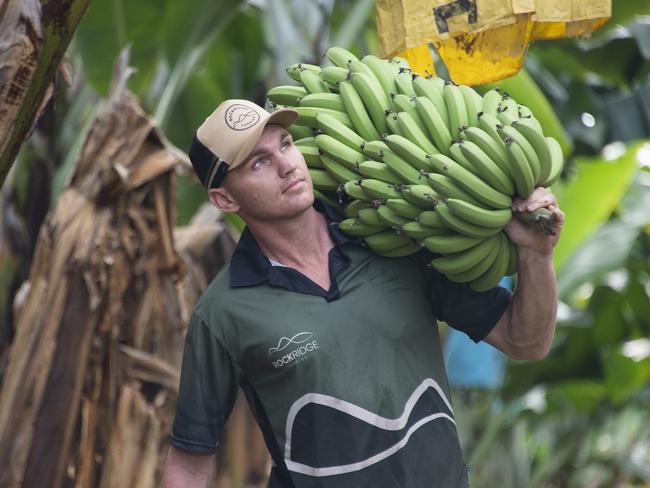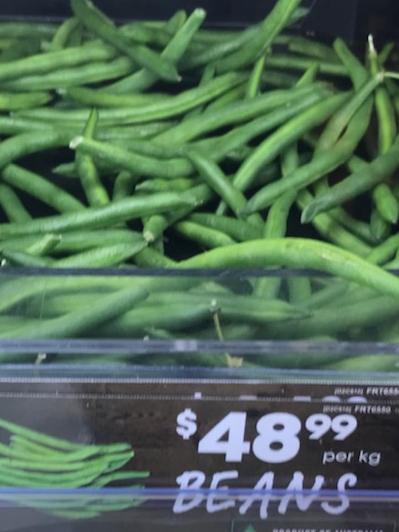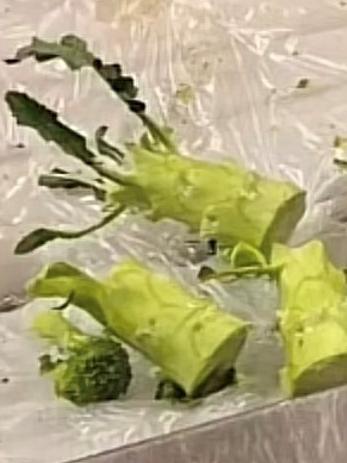Supermarkets grapple with oversupply and under-supply of fresh produce
As supermarkets try to balance chronic shortages of some items and oversupply of others, some consumers are taking matters into their own hands with “disappointing” shopping tactics. See what’s in stock and what isn’t.
QLD News
Don't miss out on the headlines from QLD News. Followed categories will be added to My News.
Bananas and avocados are in plentiful supply as supermarkets balance having too much of some produce items and not enough of others amid a tough start to the year for all growers.
Despite ongoing supply issues with some fresh produce, bananas are one of the items being harvested in abundance with local Queensland farmers growing 400,000 tonnes in the last financial year, according to Australian Bananas.
But an oversupply of product doesn’t always equal a successful growing season, according to owner of RockRidge Farming, Peter Howe.
“It’s been a bit harder than other years. There’s been more supply and less demand, the price in the last 12 months has been under the cost of production, but consumers should be happy they’ve got cheap bananas,” he said.

With the cost of production skyrocketing over the past several months, Mr Howe said next year is set to cost the farm an extra $3m for the year, all while the oversupply market fails to meet profit margins.
“We appreciate Coles and Woolies. They really take care of us, but it just happens that in an oversupply market they sell produce really cheap and in undersupply it goes higher. We will get through these times though,” he said.
There’s also been a healthy stock of avocados in Queensland supermarkets with growers urging shoppers to buy as many as they can while the prices are low due to oversupply.
“While households are feeling the pinch with inflation, we recommend that shoppers take advantage of the health-giving properties of avocados,” John Tyas, CEO of Avocados Australia, said.
“We want to let shoppers know that they can buy avocados and have a great value product that is not only delicious but also a healthy and versatile meal option.”


On the other hand, amid ongoing supply issues with iceberg lettuce, capsicums and zucchinis, green beans are the latest produce items to be wiped from shelves after devastating rains in Queensland destroyed crops.
Kelfresh sales director, Chris Cooper, said there’s been a gap in supply of green beans following months of heavy rain.
“They’re struggling to grow through the rain and then the ground has been too wet to get planting again. We expect it to pick up again in early August,” he said.
At the moment, green beans have been hit the hardest by the lack of planting, but Mr Cooper said corn, carrots and onions have also all also seen slight impacts to growing patterns.
It comes as one IGA in the Sunshine Coast was pictured selling green beans for almost $50 a kilogram.
And with prices continuing to rise on most produce items regardless of supply, some shoppers have taken it one step further in a quest to save money by ripping off broccoli stalks and banana connectors to avoid paying more at the check out.
QUT professor Gary Mortimer said rising costs were resulting in some consumers shifting to “illegitimate” shopping tactics including non-scanning, scanning the wrong items and switching price labels.
Mr Mortimer said he’s even heard of shoppers removing the connecting piece in a bunch of bananas, while there’s also been reports of people ripping off broccoli stalks.
“I think in general most shoppers do the right thing – it’s not unreasonable to try a grape or cherry in summer especially before you buy a volume of that product,” he said.
But Mr Mortimer said there are “benchmarks to facilitating this try before you buy”.
A Coles spokeswoman said the store was working to reduce food waste and it was “disappointing” to hear people were using these tactics.
“It’s disappointing to hear a small number of customers have removed the stalks from broccoli in our stores as the entire vegetable is edible and full of nutritional value,” she said.
“As part of our Together to Zero strategy, we will continue to work on ways to minimise food waste by educating customers about how to get the most out of their fresh produce.”




